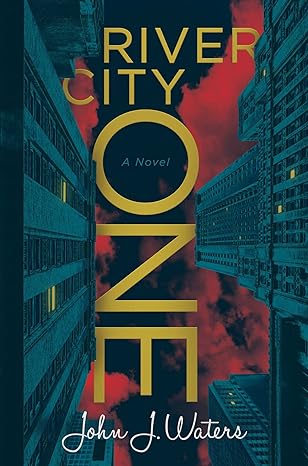
River City One: A Novel
by John J. Waters
Knox Press/Simon & Schuster
256 pp., $17.74
A new novel by John Waters, River City One makes its beginning where most novels find their conclusion: after a series of happy endings. By the novel’s first page, the life story of its protagonist—John Walker—is quite advanced. Walker has already returned from war, gotten married, welcomed a child, graduated from law school, and secured a job at a prestigious law firm. The tale with which the reader is about to engage, however, begins in a space outside of this seemingly perfect domestic life. It begins at a gun range catering to veterans, where Walker frequently encounters Dan, a friend since their first meeting at basic training, “who had tried and failed at several jobs, had ended a marriage,” and yet remained the same person as the day he returned from war, “full of the restless enthusiasm that made him believe anything was possible.”
Dan might be the same person he’s always been, but John Walker has changed. After all he’s seen of the world, a mundane existence, the Sahā world, is not for him. The novel’s first few chapters depict a hero adrift in the purposeless, cramped world that is his hometown, “River City.” John Walker is alienated from his wife and child, whom he—a possibly unreliable narrator—believes live for each other. He resides in a midsized, midwestern municipality far from the action. He finds law firm work meaningless and thinks little of his coworkers, who include obsessive company men, interchangeable drones, and insipid philosophasters. After a charged conversation with a sophisticated Irish soprano at a charity event, it seems that John Walker’s story will fit into a traditional arc where a no-longer-young man who has lost his soul to the establishment machine reclaims life through an illicit romance.
This is not to be. The middle-age-crisis storyline soon dissolves into a depiction of Walker’s psychological breakdown, which causes him to lose his wife, his job, and even his new woman in rapid succession over a few harrowing chapters. The novel finishes with an ambiguous ending, a hollow echo of the undepicted “happy ending” that was Walker’s initial return from war 10 years prior. It provides no reason to believe that this was Walker’s last doom loop—or that the next one would not be final. At the same time, however, hope is not foreclosed; there’s still time.
River City One is a powerful debut novel that depicts the difficulties many combat veterans face upon their return to civilian life, and it invites questions about how best to help. Of course, it is dangerous to conflate fiction with real life. The real world is complicated and messy; chance and randomness play a far greater role than would seem possible, much less preferable. Conversely, storytellers can declare causation, and many narratives—including many works of nonfiction such as memoirs, autobiographies, biographies, and histories—simplify and moralize the world by imposing a “so” or a “because” where an “and” or a “then” belong. At the same time, many people plug themselves into established story arcs when trying to make sense of their lives. Narrative plays a central role in maintaining mental health, including—and perhaps especially—in the aid provided by nonprofessionals trying to get themselves, friends, or family members like John Walker through the day. A better grasp on how narrative works might, therefore, be useful to those struggling themselves and to those trying to help loved ones who struggle.
One potential point of entry is something conspicuous by its absence in River City One, namely, compromise—the hallmark of the dominant plotline for novels set in normal time, according to Franco Moretti. Happy endings in successful bildungsroman require heroes willing and able to find fulfillment in the mundane, the unexceptional, the good enough. Compromise remains important in failed bildungsroman, too. Although there are some tragedies among failed bildungsroman (where a hero simply cannot make do), there also are numerous cautionary tales (where a protagonist is justly punished for his or her refusal to fit in) and sentimental stories (where the sad ending is caused by circumstance—blown opportunities or missed connections—rather than a sense that any attempt at compromise is doomed to fail).
Though compromise remains the ideal, it is not for everyone, and compromise is not nearly as prevalent in novels or movies set in extraordinary time. Compromise is hardly central to military life, where service demands absolute devotion from soldiers who must be willing and able to put themselves in extreme peril to be effective in combat. Yet veterans often say that they felt most alive when at war, and many with first-hand experience of heroic time have difficulty adjusting to ordinary time after leaving the military—unable to understand the glorification of compromised and compromising “heroes” or unwilling to respect the alpha sycophants who kowtowed their way to the top.
Those suffering with mental illness often are unable to compromise. Some seem prone to fit their experiences into a narrative of self-destruction: An insoluble crisis has disrupted their life story and condemned them to oblivion. Even if they overcome the immediate crisis, they often replace it with another. The sufferer starts to buy into a story where suicide is a rational, moral choice. Laypeople trying to fight the doom loop may counter with plots of their own. For example, some utilize a rehabilitation storyline in which the sufferer identifies the crisis that disrupted his or her life’s journey, pinpoints the rock bottom or life-saving moment that shocks him or her out of the decent, and embarks on a path to redemption. But narrative can be dangerous, particularly in the hands of nonprofessionals. Those drawn into loved ones’ narratives of despair can have a difficult time staying completely on course in their rehabilitation narratives, and any misstep can become cause for another crisis. Laypersons might instead try to disrupt the sufferer’s self-destructive narratives. This approach is described by Greg Lukianoff in The Coddling of the American Mind and advises to avoid pushing the sufferer to walk the line.
In short, time and hope are the greatest resources in dismantling self-destructive narratives, whether in fiction or real life. The drive for perfection is the mortal enemy. Those trying to help themselves, their friends, or their family members might want to remind the John Walkers of the world that the antics of the Dans in their lives may not reflect perfection, but engaging in those antics might be fun, funny, or both. And that might be good enough for the time being.

Leave a Reply